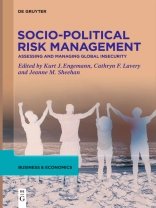Managing risk necessitates an understanding of both how to avoid detrimental outcomes and to reap beneficial results. Organizations are regularly confronted with complex decisions involving risk and the impending consequences of the negative impact of its manifestation. However, the positive aspects of embracing risk should also be sufficiently evaluated to obtain a full assessment of opportunities.
Socio-Political Risk Management: Assessing and Managing Global Insecurity covers a range of viewpoints and issues which can be applied to various organizational agency structures. These perspectives examine how social and political risk can impact an agency, and what recommendations are made to adapt, mitigate, and strengthen the organization against political risk. Accessibility to personnel and agencies via social media, the internet and public exposure compounded with political and social societal shifts have led many agencies in a constant spin to assuage and sustain viability and relevance publicly.
Socio-Political Risk Management: Assessing and Managing Global Insecurity serves the readers by raising awareness and the necessity to control social and political risks in their organizations. This volume explores pathways for those in differing organizational structures to find common threads pertaining to social and political risks. An important goal of the work is also to develop a framework for managing and exploiting risk that can be applied at the organizational level.
قائمة المحتويات
The chapters will be written by a select group of leading authors in their areas of expertise. Authors are comprised of academics and practitioners in their respective fields. Their expertise extends from public and governmental agencies, political science, criminal justice, business, community-based corrections, animal welfare and members of the private and nonprofit sectors
Part I – Fundamental Concepts, Ideas, Principles and Approaches
Policing and the social and political cost of “lost legitimacy” – Paul O’Connell
Grand corruption: capital flight and endemic risk – Michael Schidlow
Social and political risk with international non-profits: resiliency focused crime prevention programs – Heath Grant
Political risk analysis – Heinrich Matthee
Public and private organizations and sustainable global operations - Markus Biehl
Social and political risks with domestic non-profits – Katherine Kinkela
Global governance and sustainable development – Kensai Hiwaki
Socio-political risks of local elections – Stephen Morreale
Part II – Applications
The Socio-political risk of the new Title IX (sex discrimination) regulations and the impact on institutions of higher education – Cathryn Lavery
Democratic theory, higher education, and popular culture – risk and responsibility – Stevens Michels
The social and political risks of task forces in investigation and conflicts for senior management – David T. Mulcahy
An alternative model for international education – Markus Klose and Suzan Sariefe
How to effectively manage political and social risk for animal protection non-profit’s efforts toward creating social change – Kimberly Spanjol
Energy Modelling and Regulatory Compliance – Stephen Todd
Changes in the nature of self-reported risk: a longitudinal study of 10-K filings (financial performance reports) – Jeanne Zaino
عن المؤلف
Dr. Kurt Engemann is the Director of the Center for Business Continuity and Risk Management and a Professor of Information Systems and Business Analytics in the La Penta School of Business at Iona University. He is the Editor-in-Chief of the International Journal of Business Continuity and Risk Management and the International Journal of Technology, Policy and Management. He has consulted professionally in the area of risk modeling for major organizations and has been instrumental in the development of comprehensive business continuity management programs.
Dr. Cathryn Lavery is Professor and Chair of the Criminal Justice and Security Department at Pace University and comes from Iona University where she served as Chair and Graduate Coordinator. Her research and experience have been focused on sexual violence, human trafficking, officer wellness, community-based corrections, humane criminal justice education and assessments of socio-political risks in public and private agencies.
Dr. Jeanne Sheehan is a Carol S. Russett Award-winning Professor of Political Science & International Studies at Iona University where she teaches courses ranging from Quantitative Research Methods using SPSS to Political & Social Risk. She is also Bloomberg News Political Contributor, an Affiliated Faculty member with the Institute for Thomas Paine Studies (ITPS), and the author of several books and articles, including her most recent, America Democracy in Crisis: The Case for Rethinking Madisonian Government (Palgrave/Macmillan).












